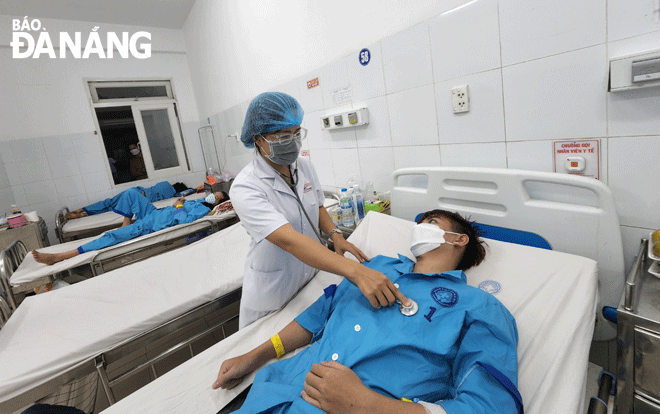Da Nang residents urged to be vigilant for symptoms of severe dengue
A health advisory is issued by the Da Nang health sector as a result of the significant increase in the number of reported dengue cases due to the arrival of rainy season. Da Nang residents are warned that many viral illnesses look alike, and that dengue can be mistaken for other illnesses. They are therefore encouraged to seek treatment as soon as possible from local healthcare facilities. The health sector is urging the public to avoid self medication in treating symptoms that may lead to fatal complications in dengue.
 |
| A dengue patient is under treatment at the Da Nang General Hospital. Photo: PHAN CHUNG |
Stay vigilant against dengue fever
Daily dengue cases in Da Nang are showing an upward trend as daily cases admited to the Ward for Tropical Diseases at the Da Nang General Hospital have hit over 40 on average in recent days. Continuous rise in the number of dengue patients has forced the Ward to open its second facility to provide treatment for them.
Doctor Truong Thi Hoa, the Deputy Head of the Ward for Tropical Diseases at the Da Nang General Hospital said that the number of hospitalized patients, including severe cases, this month is much higher than that in the previous month and the same period in 2021.
Dengue fever is a curable disease if diagnosed and treated promptly and correctly. Furthermore, patients with severe dengue illnesses can be treated successfully if they are diagnosed as early as possible. However, the symptoms of dengue fever can often be confused with flu or another virus. Most people recover within a week or so. In some cases, symptoms worsen and can become life-threatening. This is called severe dengue, dengue hemorrhagic fever or dengue shock syndrome.
Many people experience no signs or symptoms of a dengue infection. When symptoms do occur, they may be mistaken for other illnesses, such as the flu, and usually begin 4 to 10 days after you are bitten by an infected mosquito. If you have any warning signs of severe dengue, even if your initial symptoms have gotten better, go to the nearest emergency room immediately. Severe dengue can become life-threatening very quickly. If the symptoms of dengue hemorrhagic fever are not well managed, they may lead to severe bleeding and consequently shock. This may develop into dengue shock syndrome. This condition can cause death if not promptly and adequately treated. Dengue hemorrhagic fever is most common in children who are younger than 15 years of age and people who have had the infection previously.
Doctor Truong Thi Hoa advises that if dengue fever is suspected, medical attention should be sought as soon as possible from nearest healthcare facilities to avoid the risk of complications. Especically, seniors, single people, pregnant women, and high-risk groups should seek medical care immedately as they need to be closely monitored for complications during dengue fever.
“Dengue causes flu-like symptoms and lasts for 2-7 days. Dengue fever usually occurs after an incubation period of 4-10 days after the bite of the infected mosquito. When developing into severe dengue, the critical phase takes place around 3-7 days after the first sign of illness. Temperature will decrease but this does not mean the person is necessarily recovering. On the other hand, special attention needs to be given to these warning signs as it could lead to severe dengue’, Doctor Truong Thi Hoa said.
Therefore, local residents are advised to watch for signs and symptoms of severe dengue in them. It is imperative to consult a doctor and seek hospitalization to manage the disease if warning signs of severe dengue are present.
Promoting dengue vector surveillance and control
According to the Da Nang Center for Disease Control and Prevention (CDC), the city records more than 300 dengue cases on average every week. The districts reporting most cases include Hai Chau, Ngu Hanh Son, Lien Chieu, and Hoa Vang.
The city has paid special attention to surveillance activities with a focus on the rapid identification and effective management of hotspots of dengue in such districts as Cam Le, Lien Chieu, and Thanh Khe.
The city has recorded a total of 7,593 dengue cases so far this year, 19 times higher than the same period in 2021.
Doctor Nguyen Hoa, the Deputy Director of the Da Nang CDC said that prevention is still the best way to fight dengue. He stressed the need for surveillance activities that include vector surveillance and monitoring of environmental and social risk factors for dengue outbreaks to ensure that increased dengue transmission is detected early and that the response is rapid and appropriate.
The health sector is working with authorities at local level to proactively address the increased number of cases seen this year with insecticide spraying, fogging and treatment of mosquito breeding sites. Control effort is centred on the ability to sustain the intervention with sound monitoring and evaluation. Control of dengue vectors has mainly been approached by source reduction, elimination of container habitats that are favourable oviposition sites and which permit the development of the aquatic stages by killing larval and pupal stages using insecticides.
Da Nang residents are urged to play their part in controlling mosquito breeding and the spread of diseases by keeping surroundings free of debris, covering water containers, and destroying or treating potential mosquito-breeding sites.
Local residents are encouraged to stay alert on the dangers of dengue fever, as well as take action to protect themselves against dengue fever at home by destroying the possible mosquito breeding sites such as water tanks, utensils, irrigation ditches and drainages as well as disposable tires and wastes.
Authorities at local level are urged to give high priority to identifying high-risk areas of dengue in order to enable appropriate measures to be taken to control the dengue disease and reduce dengue infections.
Reporting by PHAN CHUNG – Translating by H.L